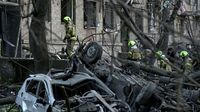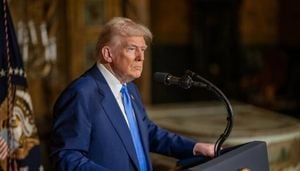In a sharp rebuke to former President Donald Trump’s recent peace proposal regarding the ongoing conflict in Ukraine, FDP defense expert Marie-Agnes Strack-Zimmermann has expressed grave concerns over the implications of such a deal. Speaking on Welt TV, she stated, "A deal is being made at the expense of Ukraine, which has been illegally attacked. This is beyond dramatic." Strack-Zimmermann's comments come as the backdrop of increasing military aggression from Russia, with reports indicating that there have been over 3,000 Russian attacks since the start of U.S.-Russia negotiations.
Strack-Zimmermann's visit to Odessa further solidified her perspective, where she described the situation as "unimaginable." She accused the Trump administration of effectively rewarding Russia with concessions while Kyiv is under heavy bombardment. Her sentiments were echoed by CDU defense politician Roderich Kiesewetter, who called for concrete military actions to bolster Ukraine's defenses. He urged Germany to lead a "coalition of the willing" to provide military support, including training Ukrainian soldiers on the Taurus cruise missile system.
Trump’s proposal, which he claims brings a peace deal "within reach," has drawn skepticism not only from Ukrainian officials but also from various political figures in Germany. In an interview, Trump criticized Ukrainian President Volodymyr Zelensky for his reluctance to concede Crimea, framing it as a major hurdle to peace. Strack-Zimmermann warned that such concessions could represent a significant turning point for Europe, stating, "This poses an immediate danger for us in Europe."
As Trump continues to push for a resolution to the conflict, the response from European leaders has been mixed. Reports suggest that Trump’s plan would largely accommodate Russian demands, including vague security guarantees for Ukraine that would place the burden on Europe. This has led to further criticism from Kiesewetter, who described the proposal as a "capitulation document" that neither Europe nor Ukraine could accept without jeopardizing their security.
In a broader context, the proposed deal could see the U.S. recognizing the Russian occupation of eastern Ukrainian regions such as Donetsk, Luhansk, Kherson, and Zaporizhzhia, as well as the annexation of Crimea, which occurred in 2014. According to Axios, Trump’s plan includes guarantees that Ukraine will never join NATO, raising alarms among European leaders about the potential ramifications of such an agreement.
Strack-Zimmermann has been particularly vocal about the implications of Trump's plan, criticizing the notion that Ukraine could be excluded from NATO while being offered membership in the European Union. She labeled this arrangement as "particularly bizarre," emphasizing that decisions about EU membership are not solely for the U.S. to make. This sentiment highlights a growing frustration in Europe regarding U.S. foreign policy and its impact on the continent's security landscape.
Furthermore, the discussions surrounding Trump's proposal have ignited fears of a potential escalation of the conflict. Kiesewetter warned that if Ukraine were to disintegrate, it could lead to mass migrations and a broader war, as Russia has previously indicated ambitions to expand its influence into Moldova and the Baltic states. Such developments could destabilize the region further, prompting calls for a unified European response to counteract Russian aggression.
As NATO chief Mark Rutte prepares to meet with U.S. officials, the focus remains on the implications of Trump's peace plan. Although he will not meet with Trump directly, the discussions will likely center on the future of Ukraine and the potential for a cohesive strategy to address the ongoing conflict. Trump’s remarks about Zelensky, suggesting that he could either accept peace or continue fighting for three more years, have only added to the tension, as many view such statements as undermining Ukraine’s sovereignty.
With the situation evolving rapidly, the international community is watching closely. The potential for a U.S. withdrawal from its commitment to Ukraine raises significant concerns about the balance of power in Eastern Europe. Jürgen Hardt, another CDU politician, labeled Trump’s proposal as a "rotten deal," indicating that if the U.S. were to pull back, Europe would need to step up its support for Ukraine even more significantly.
Strack-Zimmermann concluded her remarks with a call for Europe to remain steadfast in its support for Ukraine, emphasizing that failure to do so would embolden Russia and could have dire consequences for European security. She stated, "We must decisively support Ukraine to ensure that Russia does not succeed with its brutal aggressions, as this would also affect us in Europe."
The implications of Trump's peace proposal continue to reverberate across the political landscape, with leaders from various factions weighing in on the potential outcomes. As the U.S. navigates its role in the conflict, the need for a coordinated European response becomes increasingly crucial to counter the threats posed by Russian expansionism.





